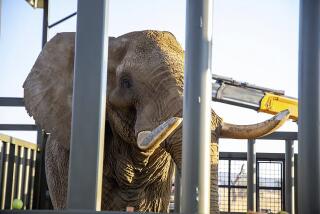Elephants distinguish human voices by sex, age, ethnicity, study says
- Share via
Elephants may be known for their memory, but it turns out they’re incredible listeners, too. African elephants who hear human voices can tell people of different sexes, ages and even ethnic groups apart, according to a new study in the journal Proceedings of the National Academy of Sciences. Such keen ears are necessary when trying to survive in territory marked by human-elephant conflict.
African elephants who live in Amboseli National Park in Kenya share land with the Maasai people, who raise and herd cattle. The two groups sporadically come into conflict over such resources as grazing land and water. Occasionally an elephant will attack cattle or even a human, and Maasai hunters will go spear an elephant in response.
But these attacks are random, from an elephant’s perspective — and thus, knowing which human is most likely to attack you is a handy skill.
“The elephants can’t predict where the people are going to be because they range over these large areas, grazing their cattle,” said Graeme Shannon, a behavioral ecologist at Colorado State University who co-led the study. “So the threat is both spatially and temporally very variable -- and so they have to respond appropriately.”
Voices offer a rich range of auditory cues, and hearing someone from a distance can also give you a key advantage in the survival game if you know what to listen for. Previous research had already shown that elephants can tell the number and sex of lions based on their roaring, and the scientists wondered if the same were true for the elephants’ other major predator, humans.
The researchers took a speaker, camouflaged it with a screen woven of palm fronds and placed it about 50 meters away from where they expected wandering elephants to end up. They pre-recorded calls from local villagers, including Maasai men, women, and young boys, saying, “Look, look over there: a group of elephants is coming.”
To compare to the Maasai, they also included calls from people known as the Kamba. Since the Kamba are farmers, not cattle herders, and their clearly defined cropland is easy for the elephants to avoid, they generally come into far less conflict with elephants.
The scientists sat in a Land Rover about 150 meters way from the speaker, waited for elephant families to wander within earshot, and videotaped their responses to the recorded voices.
The experiment took two years to complete, partly because the scientists had to space out the sessions so the elephants wouldn’t become used to the experiment. Sometimes the researchers ran into problems: Occasionally a lion came too close and set off the group’s alarms before the experiment ran. Once, in the midst of an experiment, Shannon said he accidentally hit “shuffle” on his iPod instead of playing the recorded voices -- and the speaker began blasting the Dire Straits’ 1980s classic “Money for Nothing.” The elephants were not impressed.
“They didn’t care at all,” he said. “They took a look at the speaker and wandered off.”
Elephants did, however, react with alarm to the voices of Maasai men -- they quickly huddled, protecting the calves, and raised their trunks to sniff the air for any human scent. Recordings from Maasai women or boys didn’t earn anywhere close to that kind of reaction. Neither did the voices of Kamba men.
That’s because Maasai men are the ones most likely to hunt an elephant down, the scientists said. Women don’t get involved in hunting, the boys are too young, and the Kamba farmers generally don’t need to compete with elephants for resources.
The Kamba men spoke a different language than the Maasai, so it’s likely the elephants were picking up on linguistic cues rather than some underlying, inherited differences in their voices. But the scientists aren’t sure exactly how the elephants could tell the adult male Maasai voices from the women and boys’ voices. When they remixed the men’s voices to sound more like the women’s and vice versa, the animals weren’t fooled. Figuring out that mystery will be the job of future research, Shannon said.
African elephants can live well into their 60s, and they’re known to have long memories. And the older matriarchs of these elephant clans seemed to be much better at quickly identifying an adult male Maasai’s voice, Shannon said. Younger female leaders tended to be a little more trigger happy, more likely to sniff the air if they heard a Maasai boy instead of an adult man.
So for the elderly females, their pitch-perfect ability to identify dangerous humans was probably a skill learned over long years of survival. When it comes to doing a job well, with elephants as with humans, there’s no replacement for experience.
ALSO:
Watch: Sharks with cameras record their underwater world
Drowning ants use their own babies to make life rafts
Real glass that bends without breaking? Secret lies in mollusk shells
Artificial muscle made of fishing line is 100 times stronger than yours
See these robot termites build structures using amazingly simple rules






